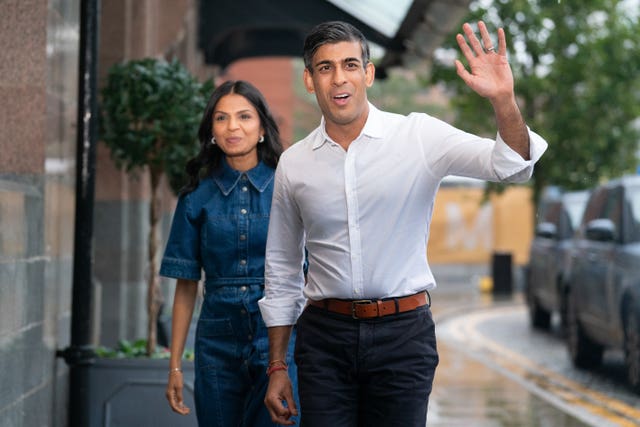Rishi Sunak has insisted that his decision to reduce the pace of net zero measures showed he was on the side of cash-strapped households despite his personal wealth.
The Prime Minister – who with his wife Akshata Murty has an estimated net worth of £529 million – was shown a word cloud on the BBC which suggested the main thing the public thought about him was he was “rich”.
But Mr Sunak pointed to his decisions on easing the shift away from gas boilers and petrol and diesel cars as signs he understood the cost pressures facing people.
“That is a decision which was motivated by me wanting to ease the burden on families,” he told the BBC’s Sunday With Laura Kuenssberg programme.
“And again, I get lots of criticism from people about that, people who could happily afford to rip out that boiler, install incredibly expensive energy efficiency upgrades in their rural home that’s off the gas grid, or change their car sooner than is necessary.
“It might be fine for them to do all those things. I don’t think it’s right, I don’t think it’s necessary. I want to save families £5-, £10-, £15-, £20,000. That’s why I made the decision I did.”
He suggested that critics of his approach were on the “extremes” of the debate.
At a rally with Tory activists, he said: “The extremes on this debate dominate. They came for me and they will keep coming.
“But we will focus on doing what we believe is right for the long term for our country.”
During his interview with Kuenssberg, Mr Sunak dodged a question on which of Boris Johnson or Liz Truss was the better prime minister – “everyone has great strengths and everyone brings something different to the job” – but took aim at Labour leader Sir Keir Starmer.

He suggested that Sir Keir was “hiding” from setting out his true approach on key issues.
Asked if there was anything he admired about Sir Keir, the Prime Minister said: “I’m not interested in talking about personalities, people can make up their own minds.
“I’m interested in setting out my vision for the country, and people can make their own judgment.
“But what I would say is: you’ve got to take a stand on things.
“I don’t expect everyone to agree with me on everything, but people will have a clear idea of what I believe, what I stand for, and the direction in which I want to lead the country.
“I don’t think actually saying nothing, hiding, is the right type of leadership. I think that’s an abdication of leadership, quite frankly.”
Setting out his own vision, Mr Sunak said: “We’re going to do things differently. We’re going to change how we do politics. And that’s how we’re going to change our country.”
